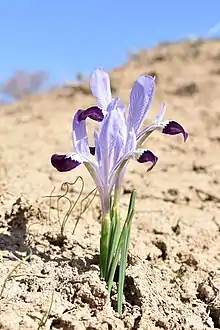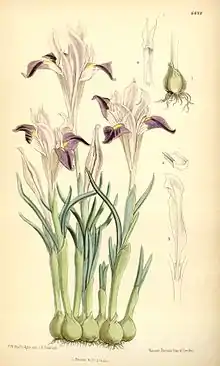Iris kolpakowskiana
Iris kolpakowskiana, or Kolpakowski's iris,[2] is a plant species in the genus Iris, it is classified in the subgenus Hermodactyloides and section Monolepsis. It is a bulbous perennial from Asia.
| Iris kolpakowskiana | |
|---|---|
 | |
| Scientific classification | |
| Kingdom: | Plantae |
| Clade: | Tracheophytes |
| Clade: | Angiosperms |
| Clade: | Monocots |
| Order: | Asparagales |
| Family: | Iridaceae |
| Genus: | Iris |
| Subgenus: | Iris subg. Hermodactyloides |
| Section: | Iris sect. Monolepsis |
| Species: | I. kolpakowskiana |
| Binomial name | |
| Iris kolpakowskiana | |
| Synonyms[1] | |
| |

Description
It has a bulb covered with a densely reticulate fibrous tunics.[3]
It has 3-4 leaves,[3] which are similar to many irises of the genus Scorpiris, although it has only a few leaves at flowering time.[4]
They are 3.5–11 cm (1.4–4.3 in) long,[3] and can increase up to 30 cm (12 in) later after flowering.[4] They are 0.2 cm wide and ribbed on the underside.[3]
It has a very short stem, green spathes (leaves of the flower bud) and perianth tube 5–9 cm (2.0–3.5 in) long.[3]
It blooms in late winter,[5] between March,[6] and April.[3]
The flowers are bi-tone (2 coloured),[7] they come in purple shades, from reddish-violet,[7] lilac-violet,[3][8] pale lilac to pale purple.[5]
Like other irises, it has 2 pairs of petals, 3 large sepals (outer petals), known as the 'falls' and 3 inner, smaller petals (or tepals), known as the 'standards'.[9]:17 The falls are lanceolate shaped, 3.5–4 cm (1.4–1.6 in) long.[3] They are dark violet, purple,[3] or dark reddish purple,[5] with a yellow,[3] or yellow orange ridge.[5][7] The standards are obovate or oblanceolate shaped and 3.5–5 cm (1.4–2.0 in) long.[3]
It has stamens with filaments that are 0.5-0.9cm long.[3]
After the iris has flowered, it produces a cylindrical with a short beak seed capsule.[3]
Biochemistry
As most irises are diploid, having two sets of chromosomes, this can be used to identify hybrids and classification of groupings.[9]:18 It was counted as 2n=20.[7][3]
Taxonomy
It is pronounced as (Iris) EYE-ris (kolpakowskiana) kol-pa-kow-skee-AY-nuh.[2] It is sometimes known as 'Kolpakowski's Iris'.[2]
It is sometimes mis-spelt as Iris kolpakowskyana. It was named after the first Russian military Governor of Semirechye Oblast in modern Kazakhstan Gerasim Alexeevich Kolpakovsky.[10][11][12] See also Sun Tulip or Kolpakowski Tulip.[13]
The iris was first described by Eduard August von Regel in the Botanical Magazine No.6489 in 1880.[5][14]
Iris kolpakowskiana is now an accepted name by the RHS,[15] and was verified by United States Department of Agriculture and the Agricultural Research Service on 2 October 2014.[16]
Distribution and habitat
It is native to temperate Asia.[16]
Range
It is found in the Tien Shan Mountains, Turkestan.[3][6][7] It is also found in Kazakhstan, Uzbekistan,[16] and Kyrgyzstan.[17]
Conservation
It was on the 1997 IUCN Red List of Threatened Plants.[20]
References
- "Iris kolpakowskiana Regel". theplantlist.org. 23 March 2012. Retrieved 31 October 2014.
- "PlantFiles: Kolpakowski's Tulip". davesgarden.com. Retrieved 24 July 2014.
- British Iris Society (1997) A Guide to Species Irises: Their Identification and Cultivation, p. 282, at Google Books
- Cassidy, G.E.; Linnegar, S. (1987). Growing Irises (Revised ed.). Croom Helm. pp. 145–146. ISBN 9780709907060.
- Walters, Stuart Max (Editor) European Garden Flora: A Manual for the Identification of Plants Cultivated, p. 354, at Google Books
- Richard Lynch The Book of the Iris, p. 164, at Google Books
- Kramb, D. (25 September 2004). "Iris aphylla". signa.org (Species Iris Group of North America). Retrieved 18 February 2018.
- Lyte, Charles (17 March 2001). "In focus: iris reticulata". Daily Telegraph. Retrieved 18 February 2018.
- Austin, Claire (2005). Irises; A Garden Encyclopedia. Timber Press. ISBN 0-88192-730-9.
- Foster, Prof. Michael (3 May 1892). "Bulbous Irises". Retrieved 16 July 2014.
- "All results for Kolpakowski in Newspaper Archive". myheritage.com. Retrieved 24 July 2014.
- "Победа казаков и казахов". Archived from the original on 2016-02-05. Retrieved 2015-05-22.
- "Kolpakowski Tulip, aka Sun Tulip". www.paghat.com. Retrieved 24 July 2014.
- "Iridaceae Iris kolpakowskiana Regel". ipni.org (International Plant Names Index). Retrieved 31 October 2014.
- "Iris kolpakowskiana". www.rhs.org.uk. Retrieved 31 October 2014.
- "Iris kolpakowskiana". Germplasm Resources Information Network (GRIN). Agricultural Research Service (ARS), United States Department of Agriculture (USDA). Retrieved 22 August 2015.
- Sasha W. Eisenman, David E. Zaurov, Lena Struwe Medicinal Plants of Central Asia: Uzbekistan and Kyrgyzstan: Uzbekistan and Kyrgyzstan, p. 5, at Google Books
- "Iris kolpakowskiana". www.alpinegardensociety.net. 2013. Retrieved 24 July 2014.
- "Reticulata Irises". www.pacificbulbsociety.org. 11 May 2014. Retrieved 14 July 2014.
- Kerry Scott Walter, Harriet J. Gillett (Editors) 1997 IUCN Red List of Threatened Plants, p. 679, at Google Books
Other sources
- Czerepanov, S. K. 1995. Vascular plants of Russia and adjacent states (the former USSR). (referred to as Iridodictyum kolpakowskianum (Regel) Rodion)
- Komarov, V. L. et al., eds. 1934–1964. Flora SSSR.
- Mathew, B. 1981. The Iris. 177.
External links
 Media related to Iris kolpakowskiana at Wikimedia Commons
Media related to Iris kolpakowskiana at Wikimedia Commons Data related to Iris kolpakowskiana at Wikispecies
Data related to Iris kolpakowskiana at Wikispecies